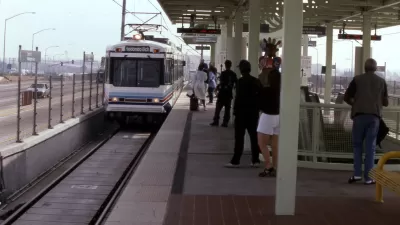Indianapolis is a thriving job market, while Detroit is rapidly decaying and drying up. What's the difference? Policies encouraging public-private partnerships, according to this article from Next American City.
"Many politicians and members of the business community suggest that public-private partnerships - deals in which the government partners with the private sector to deliver a necessary service that it cannot afford, or which it wishes to provide more efficiently - have allowed Indianapolis to prosper. City governments can form PPPs to support small-scale projects, and may also lease the operation of their own assets, but if they want to forge a PPP to back a larger initiative, like a massive infrastructure project, they need legislative support from the state. Indiana law permits the formation of PPPs for infrastructure projects; Michigan law does not."
"The average American city works with private partners to perform 23 of 65 basic municipal services, says Rick Norment, executive director of the National Council on Public Private Partnerships."
"Some states have been slow to adopt PPP legislation because the deal structure can be viewed with suspicion. Unions may misunderstand how such partnerships function, says Norment, while local officials express concern that PPPs take jobs away from the public sector or allow big companies to come in and "squeeze out" local contractors."
FULL STORY: Can PPPs Save Detroit?

Planetizen Federal Action Tracker
A weekly monitor of how Trump’s orders and actions are impacting planners and planning in America.

Map: Where Senate Republicans Want to Sell Your Public Lands
For public land advocates, the Senate Republicans’ proposal to sell millions of acres of public land in the West is “the biggest fight of their careers.”

Restaurant Patios Were a Pandemic Win — Why Were They so Hard to Keep?
Social distancing requirements and changes in travel patterns prompted cities to pilot new uses for street and sidewalk space. Then it got complicated.

Platform Pilsner: Vancouver Transit Agency Releases... a Beer?
TransLink will receive a portion of every sale of the four-pack.

Toronto Weighs Cheaper Transit, Parking Hikes for Major Events
Special event rates would take effect during large festivals, sports games and concerts to ‘discourage driving, manage congestion and free up space for transit.”

Berlin to Consider Car-Free Zone Larger Than Manhattan
The area bound by the 22-mile Ringbahn would still allow 12 uses of a private automobile per year per person, and several other exemptions.
Urban Design for Planners 1: Software Tools
This six-course series explores essential urban design concepts using open source software and equips planners with the tools they need to participate fully in the urban design process.
Planning for Universal Design
Learn the tools for implementing Universal Design in planning regulations.
Heyer Gruel & Associates PA
JM Goldson LLC
Custer County Colorado
City of Camden Redevelopment Agency
City of Astoria
Transportation Research & Education Center (TREC) at Portland State University
Camden Redevelopment Agency
City of Claremont
Municipality of Princeton (NJ)





























